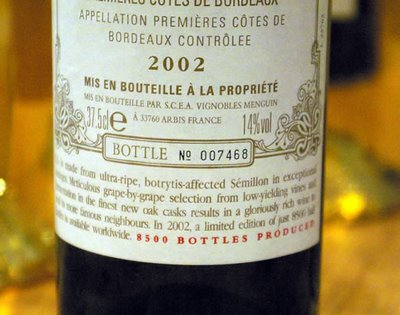Sweet wines: Sauternes and its neighbours
 I must admit, I do enjoy sweet wines. But not very often, because I can't seem to generate enough situations where it seems appropriate to pop the cork on something sweet. It's not like you'd open a bottle of Sauternes at 6 pm and drink it for the evening, is it?
I must admit, I do enjoy sweet wines. But not very often, because I can't seem to generate enough situations where it seems appropriate to pop the cork on something sweet. It's not like you'd open a bottle of Sauternes at 6 pm and drink it for the evening, is it?I've been opening quite a few sweet wines from Sauternes and other neighbouring Bordeaux regions over the last few days because I had some samples in. It's been quite fun: overall, the quality has been good, and while these are by no means the best or most expensive examples of sweet wines from Bordeaux, they're pretty consistent, with one notable exception.
The exception was a Laithwaites wine, which was actually quite awful: the LS Semillon 2002 1er Cotes de Bordeaux. The thing is, it looked so good from the label (above), but unfortunately this tasted like cheap, dilute sweet white Bordeaux - not worth (to my palate) the asking price of over £6 for a half. In fact, I wouldn't buy this if it was £2 a half. [I hate to write negative notes, but sometimes the real underperforming wines need to be outed. I also think it's healthy for critics to be critical: my job is to write for consumers, not to act as a PR agent for the wine trade.]
The others, from Cadillac, Loupiac, Sainte-Croix-du-Mont and Sauternes itself, have all been enjoyable wines. With their golden colours, presented in clear glass bottles with white labels and gold capsules, they also look stunning. Probably the best (certainly in terms of value) has been the Chateau La Caussade 2004 Sainte-Croix-du-Mont (£11.86 Waitrose for 75 cl). Yellow/gold in colour, this has an appealing nose of honey, lanolin, spice and ripe peach. The palate is richly textured and broad, with sweet melon and apricot fruit balanced by a subtly spicy bite. It's not as intense or multidimensional as the best Sauternes can be, but it's still a really nicely balanced wine.
My only concern with drinking these sweet wines is how fat I'll get. They're deliciously sweet, with perhaps 130 grams/litre of residual sugar. That means a bottle will have roughly 100 grams of sugar in it, which, together with the alcohol, sounds like a lot of calories. Has anyone done the maths?
Labels: Bordeaux, Sauternes, sweet wine


 The web log of wine journalist Jamie Goode. Feel free to nose around; your comments are welcome
The web log of wine journalist Jamie Goode. Feel free to nose around; your comments are welcome 
